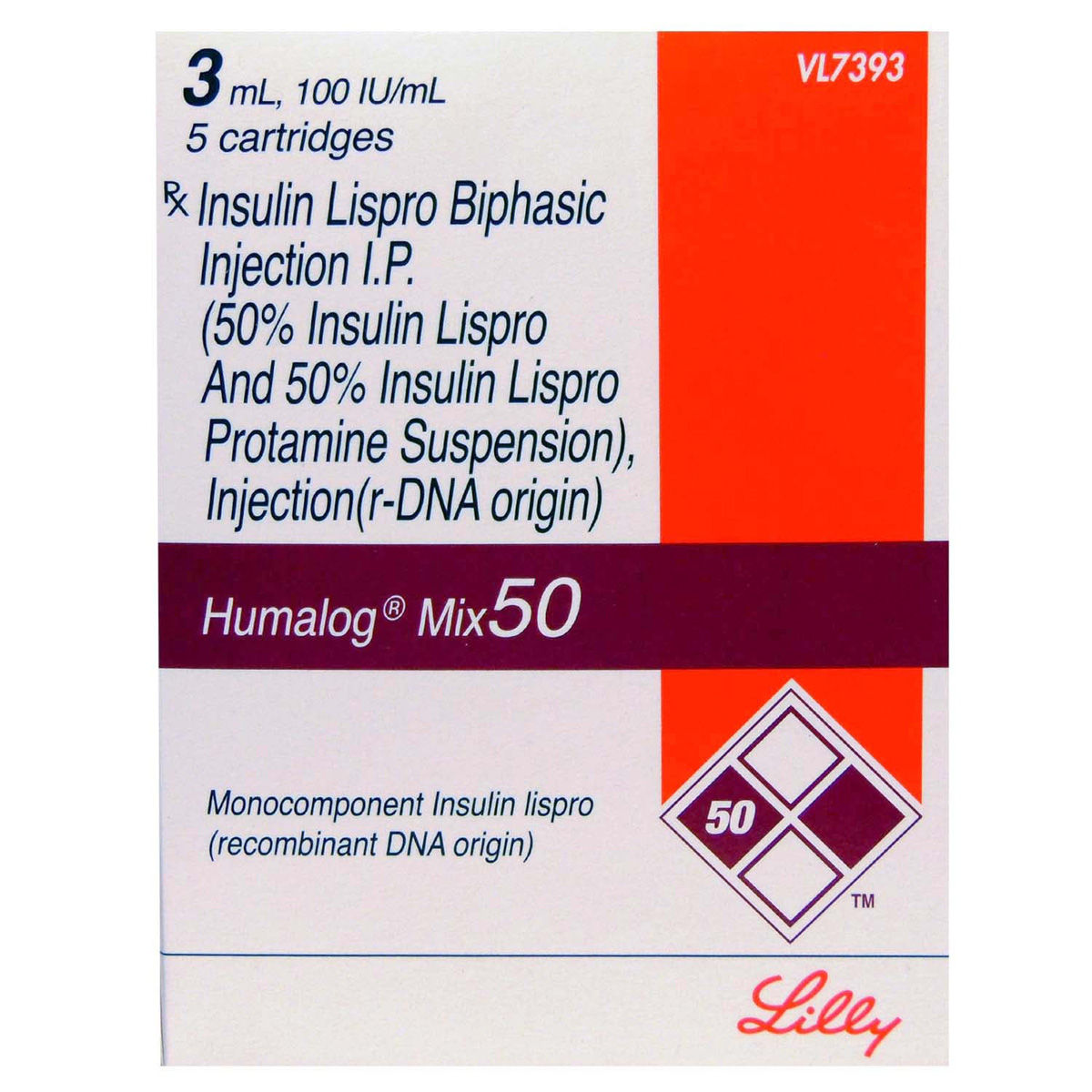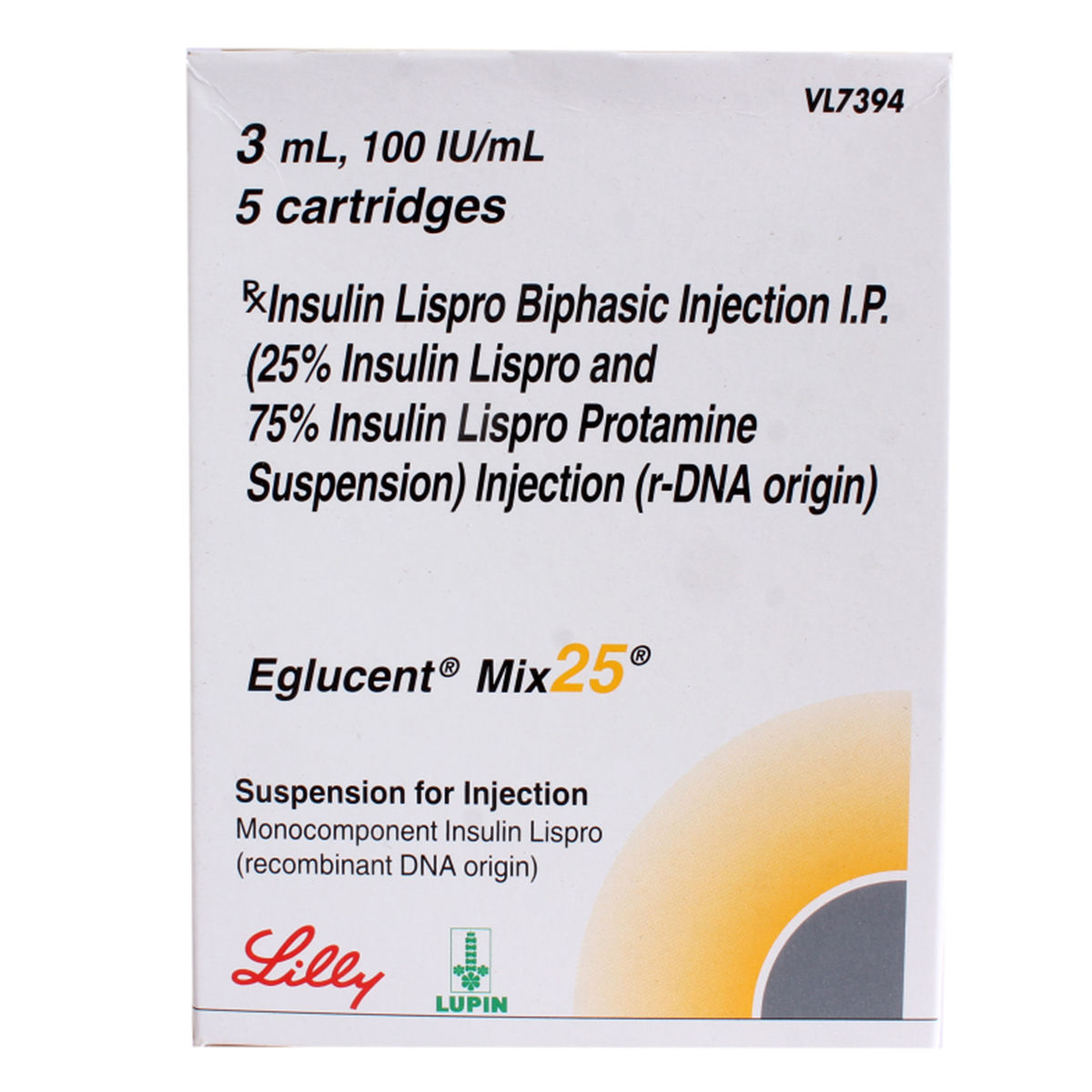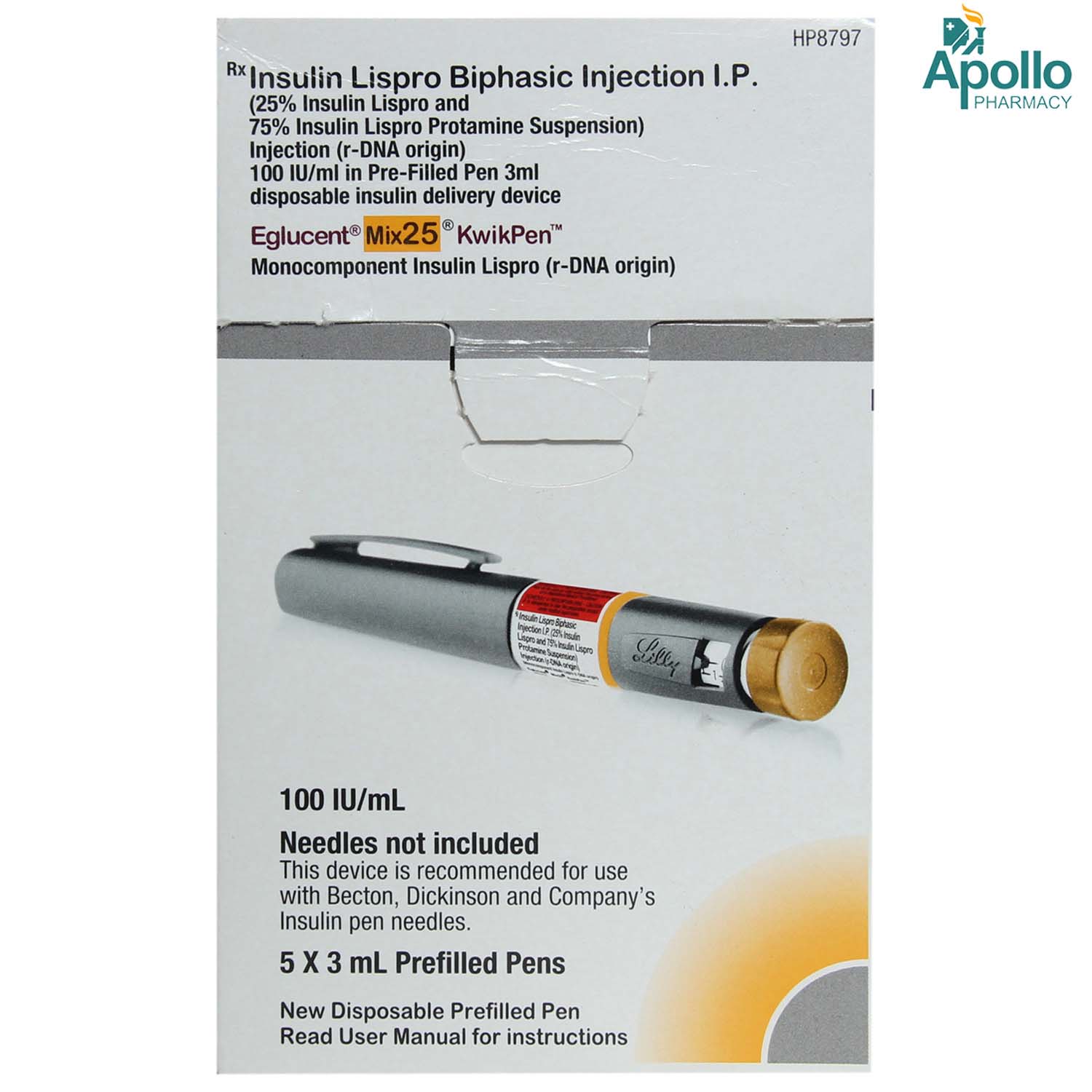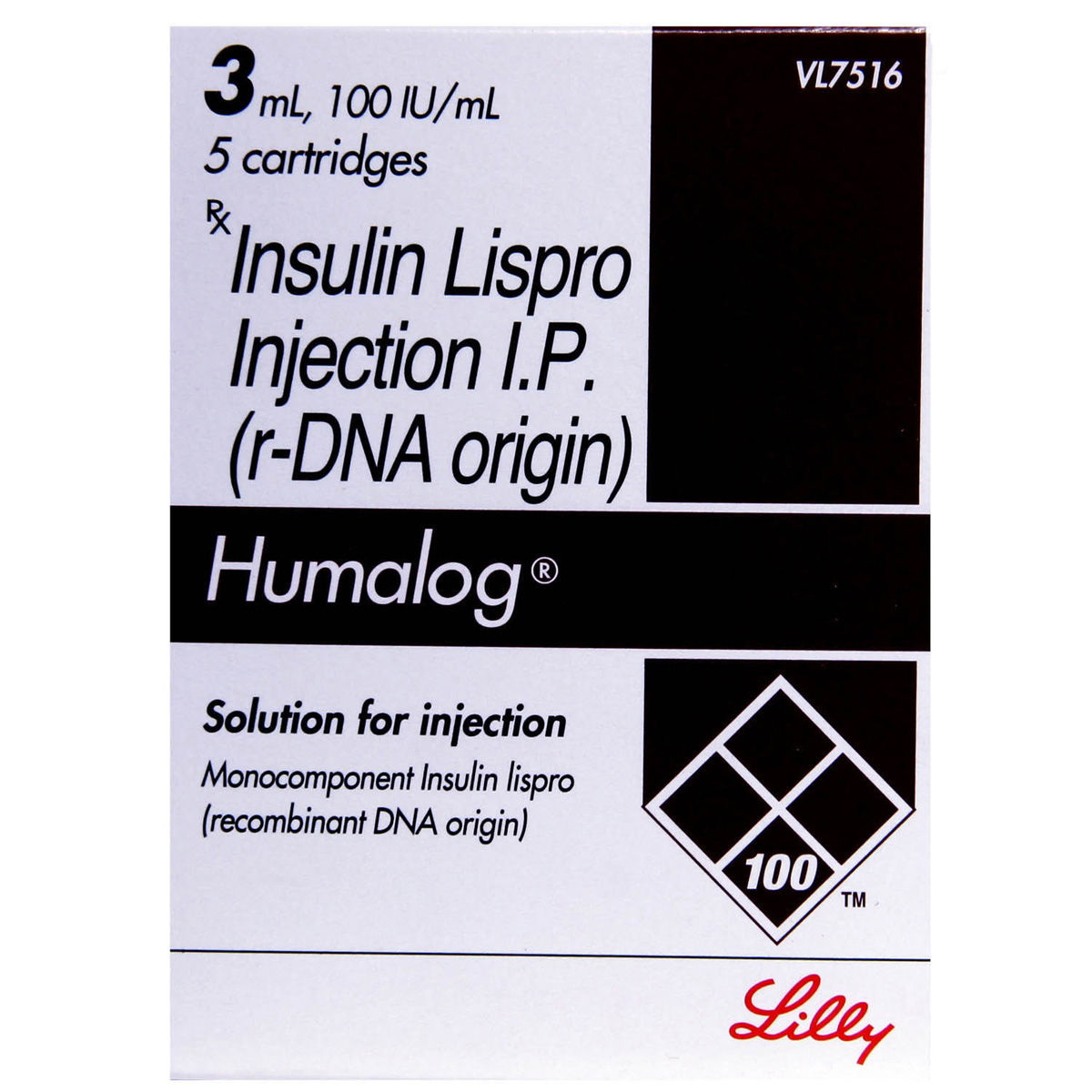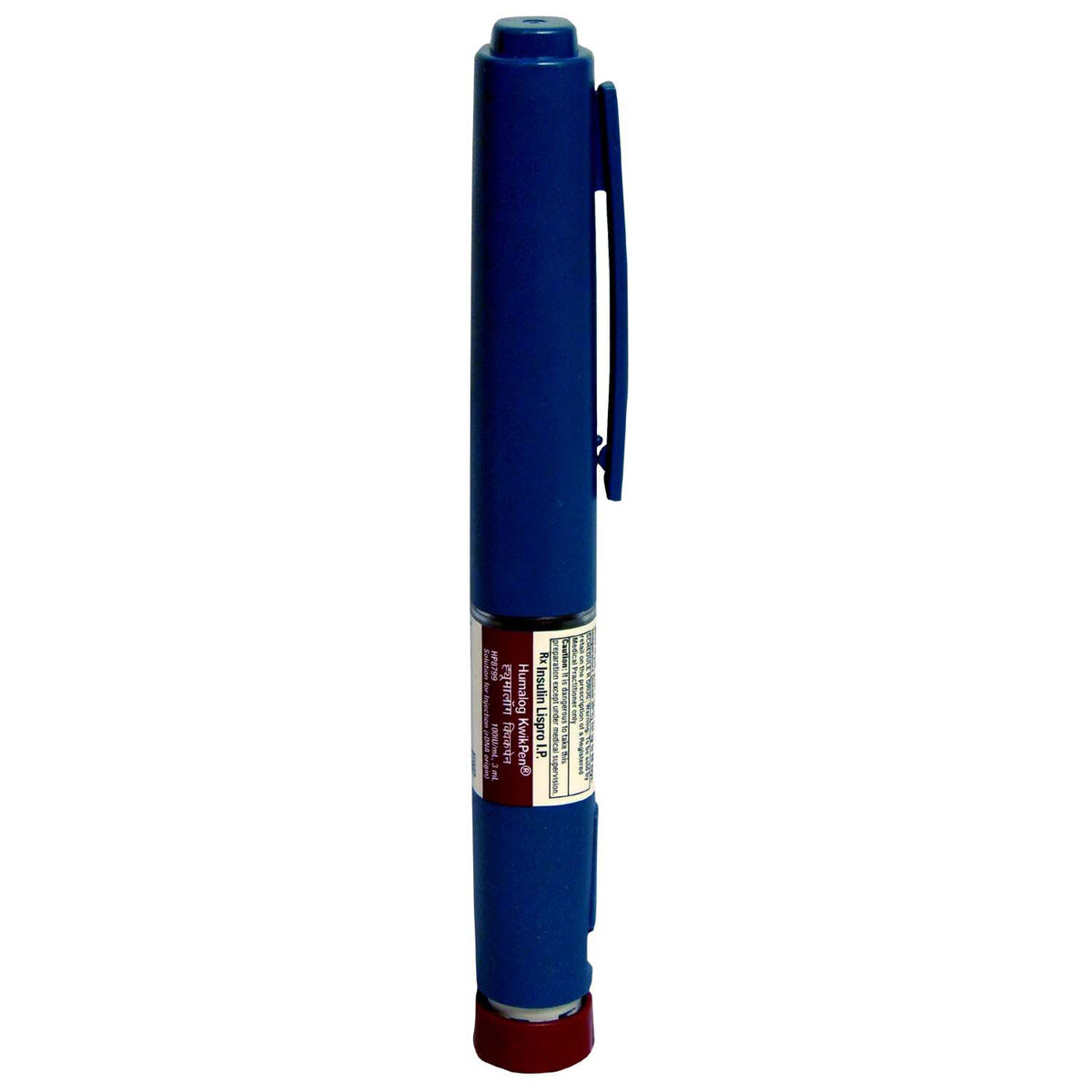Insulin Lispro
About Insulin Lispro
Insulin Lispro is used to treat type 1 and type 2 diabetes mellitus. Diabetes mellitus is a condition that affects how the body processes glucose. In Diabetes Mellitus Type 1, the body does not produce enough insulin to regulate blood sugar levels. On the other hand, in Diabetes Mellitus type 2, either the body stops producing enough insulin (a hormone that helps lower blood sugar levels), or there is resistance to insulin action.
Insulin Lispro works similarly to the insulin produced by the body. Insulin Lispro stops the liver from producing more sugar and also helps move the sugar from the blood into other body tissues where it can be used for energy. Thereby, Insulin Lispro helps control blood sugar levels.
Your doctor will advise you on how to use Insulin Lispro. In some cases, you may experience injection site reactions like redness or swelling. You may also experience symptoms of hypoglycaemia and low blood sugar) such as cold sweat, cool pale skin, nervousness or tremor, anxious feeling, unusual tiredness or weakness, confusion, difficulty in concentration, drowsiness, excessive hunger, temporary vision changes, headache, nausea, and palpitation (very high heartbeat). Most of these side effects of Insulin Lispro do not require medical attention and gradually resolve over time. However, if the side effects are persistent, reach out to your doctor.
Try not to stop taking Insulin Lispro on your own as it may increase blood sugar levels. Do not take the Insulin Lispro if you have low blood glucose levels, kidney, liver, or heart problems. Along with the Insulin Lispro, you should take a healthy diet, exercise regularly, and maintain weight as your doctor advises. Insulin Lispro is a cold chain medicine, so it must be stored in the refrigerator between 2-8 degrees Celsius; otherwise, its efficiency might decrease. Do not freeze.
Uses of Insulin Lispro
Medicinal Benefits
Insulin Lispro works by ensuring rapid and consistent sugar control. It facilitates the reuptake of sugar in muscle and fat cells and thus suppresses sugar production in the liver. It helps to decrease blood sugar levels after the intake of meals. It prevents the chances of developing serious complications of diabetes. Besides this, Insulin Lispro can be safely prescribed during the pregnancy as well as the lactation stage. Insulin Lispro helps in improving glycaemic control, which in turn decreases the risk of progression of complications of diabetes like damage of the retina (retinopathy), impairment of kidney (nephropathy), impairment of nerve cells (neuropathy), delayed wound healing, diabetic foot ulcer and others.
Directions for Use
Storage
Side Effects of Insulin Lispro
Hypoglycemia (low blood glucose levels)
Injection site reactions (redness, swelling)
Drug Warnings
Insulin Lispro is for subcutaneous use only and should never be administered intravenously (IV) or in the veins. Cases of heart failure have been reported when pioglitazone was used with insulin, especially in patients who are at high risk of cardiac heart failure. The first symptoms of hyperglycaemia (high blood sugar level) may include symptoms like excessive thirst, dry mouth, increased frequency of urination, nausea, vomiting, drowsiness, flushed dry skin, loss of appetite and acetone odour of the breath. You should closely monitor these symptoms. Symptoms like heart failure, weight gain and oedema (fluid deposition in tissue) should not be overruled. It is advisable not to consume alcohol as it may either increase or decrease your blood glucose level. Care should be taken while travelling across more than two time zones. Your doctor may adjust your insulin schedule. Insulin Lispro may decrease the level of potassium, leading to a state of hypokalaemia that, if left untreated, may lead to respiratory paralysis, irregular heartbeat rhythm, coma and even death. Do not take Insulin Lispro if you have any low blood glucose levels, kidney, liver, or heart problems.
Drug Interactions
Drug-Drug Interactions: Insulin Lispro may have an interaction with anti-depressants (phenelzine, iproniazid, isocarboxazid, nialamide, imipramine, desipramine, tranylcypromine, moclobemide), anti-Parkinson’s drug (selegiline), antibiotic (linezolid), (lithium, tryptophan), migraines drug (sumatriptan), pain killer (tramadol), anti-ulcer (cimetidine, lansoprazole, omeprazole), anti-fungal (fluconazole), anti-stroke pills (ticlopidine), blood-thinners (warfarin, dipyridamole, and phenprocoumon), antimalarial (mefloquine), heart-related drug (flecainide, propafenone), and medicines that decrease blood levels of potassium or magnesium, as these increase the risk of life-threatening heart rhythm disorder. Besides this, the use of oral antidiabetic pills like pramlintide acetate and antibiotics (pentamidine) may cause hypoglycaemia (low blood sugar level).
Drug-Food Interactions: Limit or avoid intake of alcoholic beverages with Insulin Lispro as it may increase or decrease your blood sugar level.
Drug-Disease Interactions: Insulin Lispro should not be given to patients with kidney disease, liver disease, low potassium level (hypokalaemia), and low blood sugar/glucose level (hypoglycaemia).
Drug-Drug Interactions Checker List:
Safety Advice

Alcohol
unsafeYou are recommended not to consume alcohol along with Insulin Lispro to avoid unpleasant side-effects. Alcohol may either decrease or increase the blood sugar level which can be fatal.

Pregnancy
safe if prescribedPlease inform your doctor if you are pregnant as a dose adjustment may be required. The amount of insulin you need usually falls during the first three months of pregnancy and increases for the remaining six months. If you are breast-feeding, you may need to alter your insulin intake or diet.

Breast Feeding
safe if prescribedPlease inform your doctor if you are breastfeeding as a dose adjustment may be required.

Driving
cautionDrive with caution, Insulin Lispro usually causes drowsiness and affects driving ability. Your ability to concentrate and react may be reduced if you have hypoglycaemia (low blood sugar).

Liver
cautionInsulin Lispro to be taken with caution, especially if you have a history of liver diseases/conditions. The dose may have to be adjusted by your doctor.

Kidney
cautionInsulin Lispro to be taken with caution, especially if you have a history of kidney diseases/conditions. The dose may have to be adjusted by your doctor.

Children
safe if prescribedInsulin Lispro can be given safely to children provided; dose has to be prescribed by a child specialist.
Habit Forming
Diet & Lifestyle Advise
- Exercise may lower your body’s need for insulin during and for some time after the physical activity.
- Exercise may also speed up the effect of an insulin dose, especially if the exercise involves the area of injection site (for example, the leg should not be used for injection just prior to running).
- Discuss with your doctor how you should adjust your insulin regimen to accommodate exercise.
- Avoid eating sugar food and prefer food cooked food low in calories.
- When travelling across more than 2 time zones, you should talk to your doctor concerning adjustments in your insulin schedule.
Special Advise
- You should normally inject Insulin Lispro within 15 minutes of a meal.
- Always use a new sterile needle for each injection.
Patients Concern
Disease/Condition Glossary
Diabetes: Diabetes is a chronic or lifelong disease that prevents the body from utilizing insulin properly. Insulin is the hormone that controls sugar levels in the blood. Diabetes is a condition in which blood glucose levels are above normal. It is of two types: type-1 and type-2 diabetes. Type-1 diabetes is a condition in which the pancreas produces little or no insulin. Type-2 diabetes affects the way body processes the sugar. Symptoms of diabetes include lack of energy, tiredness, frequent urination, excess thirst, dry mouth, blurry vision, constant hunger, weight loss, and itchy skin.
FAQs
Insulin Lispro is used to treat type 1 and type 2 diabetes mellitus. It facilitates the reuptake of sugar in muscle and fat cells and thus suppresses sugar production in the liver.
Insulin Lispro should not be given into the veins or intravenously (IV) route. It should be only administered in the subcutaneous region below the skin. Abdomen regions (stomach) is the best site for the injecting Insulin Lispro. However, you can also inject Insulin Lispro in the upper arm, or thigh region.
Yes, you should inform your doctor before travelling specially when travelling to a different time zone as a dose adjustment may be required.
Insulin Lispro is a cold chain medicine which has to be stored 2-8 degree celsius only else its efficiency of reducing blood glucose level declines. Do not keep inside the freezer. So, if it is not stored between 2-8 degree celsius its efficiency may decrease.
Insulin Lispro shows its effect within half an hour after you take it. It shows maximum effect between 1-4 hours after you take and its effects last up to 24 hours.
Insulin Lispro can be given to treat both the condition of type 1 and type 2 diabetes mellitus. However, your doctor will decide whether Insulin Lispro can be given to you or not depending on your present condition. Insulin Lispro should be avoided in patients who are allergic to Insulin Lispro or other forms of insulin. It should be avoided in patients suffering from low potassium level (hypokalemia), moderate to severe kidney disease or liver disease. Inform the doctor if you are pregnant or breastfeeding.
Yes, Insulin Lispro can cause oedema (e.g. swelling in arms, ankles; fluid retention), especially at the start of insulin therapy or during a change in therapy to improve control of your blood glucose. If it persists, please consult your doctor.
The side effects of Insulin Lispro are hypoglycemia (low blood sugar) and injection site reactions (redness, swelling). If these side effects persist or worsen, please consult your doctor.
You are recommended to avoid white bread, maida, poori, naan, noodles, biryani, fried rice, corn flakes, cheese, ice creams, milkshakes, beef, pork, sugarcane juice, soft drinks, sweetened health drinks and beverages. Also, avoid mango, seetaphal, jack fruit, fruit salads with ice cream, and fruit-based desserts.
No, do not stop taking the injection without first consulting a doctor as discontinuing suddenly may cause high blood sugar levels and worsen the disease condition and put you at risk for complications. If you experience any discomfort or side effects, talk to your doctor as you may need a change in dose.
Taking injection at the same site may cause local irritation, itching and lump formation. Therefore, it is best to avoid taking injections at the same site or maintain a gap of at least one day.
Maintain a diet that includes chapatis, puffed rice with vegetables, multigrain bread, plain cooked dal, roasted grams soups, sprouts, cooked vegetables with less oil, steamed vegetables, orange, jamun, guava, watermelon, apple, papaya, curd, cow’s milk, thin buttermilk, fish (baked, grilled, or steamed), cashew nuts, peanuts, and walnuts (handful). Avoid alcohol consumption and quit smoking. Exercise regularly and brisk walk daily for 30 minutes. Also, limit intake of sugar.
The risk factors for developing low blood sugar levels include not taking adequate meals or skipping meals, excessive insulin use, too much alcohol intake, fever and too much exercise. Some medications, like other diabetes medicine glimepiride, medicines used for fever and pain (salicylates), ramipril, etc., can result in such episodes when used with insulin. Inform your doctor about these episodes as you may need dose adjustment.


